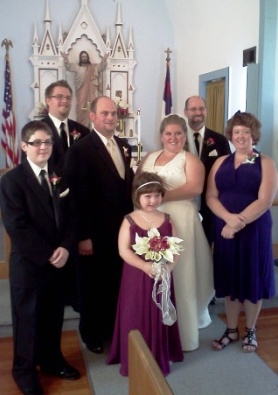RESOLVE: Infertility Etiquette, Part 2 #NIAW
Julie's note: April 23-29 is #NIAW---National Infertility Awareness Week. Although my infertility experiences are not recent, I remember the anguish, comments, and the devastation as if it were yesterday. I will be sharing information from RESOLVE.org in hopes of helping readers better understand infertility. If you are looking for more personal resources, A WALK IN THE VALLEY is a workbook/devotional that takes readers through six different infertility experiences from diagnosis to doctors to where we are now. I am one of the authors and it is a raw, but helpful book I so wish had existed when I was hurting. You can purchase A WALK IN THE VALLEY HERE.
Infertility Etiquette
Chances are, you know someone who is struggling with infertility. More than seven million people of childbearing age in the United States experience infertility. Yet, as a society, we are woefully uninformed about how to best provide emotional support for our loved ones during this painful time.
Infertility is, indeed, a very painful struggle. The pain is similar to the grief over losing a loved one, but it is unique because it is a recurring grief. Infertile people grieve the loss of the baby that they may never know. They grieve the loss of that baby who would have had mommy’s nose and daddy’s eyes. But, each month, there is the hope that maybe that baby will be conceived after all. No matter how hard they try to prepare themselves for bad news, they still hope that this month will be different. Then, the bad news comes again, and the grief washes over the infertile couple anew. This process happens month after month, year after year. It is like having a deep cut that keeps getting opened right when it starts to heal.
As the couple moves into infertility treatments, the pain increases while the bank account depletes. The tests are invasive and embarrassing to both parties, and you feel like the doctor has taken over your bedroom. And for all of this discomfort, you pay a lot of money.
A couple will eventually resolve the infertility problem in one of three ways:
- They will eventually conceive a baby.
- They will stop the infertility treatments and choose to live without children.
- They will find an alternative way to parent, such as by adopting a child or becoming a foster parent.
Reaching a resolution can take years, so your infertile loved ones need your emotional support during this journey. Most people don’t know what to say, so they wind up saying the wrong thing, which only makes the journey so much harder for their loved ones. Knowing what not to say is half of the battle to providing support.

Don’t Treat Them Like They Are Ignorant
For some reason, some people seem to think that infertility causes a person to become unrealistic about the responsibilities of parenthood. I don’t follow the logic, but several people told me that I wouldn’t ache for a baby so much if I appreciated how much responsibility was involved in parenting.
Let’s face it-no one can fully appreciate the responsibilities involved in parenting until they are, themselves, parents. That is true whether you successfully conceived after one month or after 10 years. The length of time you spend waiting for that baby does not factor in to your appreciation of responsibility. If anything, people who have been trying to become pregnant longer have had more time to think about those responsibilities. They have also probably been around lots of babies as their friends started their families.
Perhaps part of what fuels this perception is that infertile couples have a longer time to “dream” about what being a parent will be like. Like every other couple, we have our fantasies-my child will sleep through the night, would never have a tantrum in public, and will always eat his vegetables. Let us have our fantasies. Those fantasies are some of the few parent-to-be perks that we have-let us have them. You can give us your knowing looks when we discover the truth later.
Don’t Gossip About Your Friend’s Condition
Infertility treatments are very private and embarrassing, which is why many couples choose to undergo these treatments in secret. Men especially are very sensitive to letting people know about infertility testing, such as sperm counts. Gossiping about infertility is not usually done in a malicious manner. The gossipers are usually well-meaning people who are only trying to find out more about infertility so they can help their loved ones.
Regardless of why you are sharing this information with someone else, it hurts and embarrasses your friend to find out that Madge the bank teller knows what your husband’s sperm count is and when your next period is expected. Infertility is something that should be kept as private as your friend wants to keep it. Respect your friend’s privacy, and don’t share any information that your friend hasn’t authorized.
Don’t Push Adoption (Yet)
Adoption is a wonderful way for infertile people to become parents. (As an adoptive parent, I can fully vouch for this!!) However, the couple needs to work through many issues before they will be ready to make an adoption decision. Before they can make the decision to love a “stranger’s baby,” they must first grieve the loss of that baby with Daddy’s eyes and Mommy’s nose. Adoption social workers recognize the importance of the grieving process. When my husband and I went for our initial adoption interview, we expected the first question to be, “Why do you want to adopt a baby?” Instead, the question was, “Have you grieved the loss of your biological child yet?” Our social worker emphasized how important it is to shut one door before you open another.
You do, indeed, need to grieve this loss before you are ready to start the adoption process. The adoption process is very long and expensive, and it is not an easy road. So, the couple needs to be very sure that they can let go of the hope of a biological child and that they can love an adopted baby. This takes time, and some couples are never able to reach this point. If your friend cannot love a baby that isn’t her “own,” then adoption isn’t the right decision for her, and it is certainly not what is best for the baby.
Mentioning adoption in passing can be a comfort to some couples. (The only words that ever offered me comfort were from my sister, who said, “Whether through pregnancy or adoption, you will be a mother one day.”) However, “pushing” the issue can frustrate your friend. So, mention the idea in passing if it seems appropriate, and then drop it. When your friend is ready to talk about adoption, she will raise the issue herself.
So, what can you say to your infertile friends? Unless you say “I am giving you this baby,” there is nothing you can say that will erase their pain. So, take that pressure off of yourself. It isn’t your job to erase their pain, but there is a lot you can do to lessen the load. Here are a few ideas.
Let Them Know That You Care
The best thing you can do is let your infertile friends know that you care. Send them cards. Let them cry on your shoulder. If they are religious, let them know you are praying for them. Offer the same support you would offer a friend who has lost a loved one. Just knowing they can count on you to be there for them lightens the load and lets them know that they aren’t going through this alone.
Remember Them on Mother’s Day
With all of the activity on Mother’s Day, people tend to forget about women who cannot become mothers. Mother’s Day is an incredibly painful time for infertile women. You cannot get away from it-There are ads on the TV, posters at the stores, church sermons devoted to celebrating motherhood, and all of the plans for celebrating with your own mother and mother-in-law.
Mother’s Day is an important celebration and one that I relish now that I am a mother. However, it was very painful while I was waiting for my baby. Remember your infertile friends on Mother’s Day, and send them a card to let them know you are thinking of them. They will appreciate knowing that you haven’t “forgotten” them.
Support Their Decision to Stop Treatments
No couple can endure infertility treatments forever. At some point, they will stop. This is an agonizing decision to make, and it involves even more grief. Even if the couple chooses to adopt a baby, they must still first grieve the loss of that baby who would have had mommy’s nose and daddy’s eyes.
Once the couple has made the decision to stop treatments, support their decision. Don’t encourage them to try again, and don’t discourage them from adopting, if that is their choice. Once the couple has reached resolution (whether to live without children, adopt a child, or become foster parents), they can finally put that chapter of their lives behind them. Don’t try to open that chapter again.









